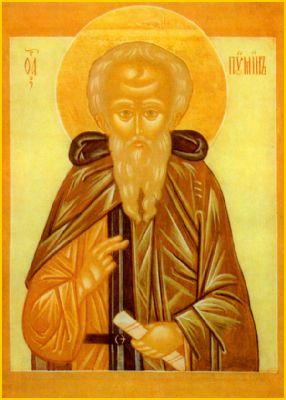|
|||
|---|---|---|---|
| This weekly bulletin insert complements the curriculum published by the Department of Christian Education of the Orthodox Church in America. This and many other Christian Education resources are available at http://dce.oca.org. | |||

The Venerable Poemen (often spelled Pimen) was one of the most prominent of the desert-dwelling ascetics, born in Egypt in the fifth century. As a young man, Poemen visited great monastics, sharing their way of living and learning from them. He spent the rest of his life as a monk in the Egyptian desert. In any collection of sayings of the desert fathers, quotations from Poemen will fill several pages. He clearly had a strong and lasting effect on those around him, teaching others by the example of his disciplined and holy life. Those who knew him and lived with him remembered and recorded what he said. In Galatians 2: 6-20 we find Saint Paul, also a well-respected and well-remembered teacher, saying several things that agree with Saint Poemen's teachings. They are expressed differently, of course, but these two men had similar understandings of God and His love. Paul reports in these verses that the apostles James, Cephas and John gave him and his helper Barnabas "the right hand of fellowship" when they saw that he had been given the grace to preach the Gospel to the uncircumcised—the Gentiles—just as Peter "had been entrusted with the Gospel to the circumcised" (2:7). In saying this, Paul is validating his own ministry by pointing out that the other apostles, who had been with Christ and were considered leaders, accepted him as a comrade and fellow worker. But he is also noting gratefully that God accepts the service of people whose skills, backgrounds, and characters differ widely, as his and Peter's certainly did. Some words of Saint Poemen make a similar point: "If three men meet, of whom the first fully preserves interior peace, and the second gives thanks to God in illness, and the third serves with a pure mind, these three are doing the same work." Poemen, like Paul, appreciates the generosity and wisdom of God, who so willingly finds value in the varied efforts and abilities of the human beings who "are doing the same work."
Saint Paul refers to the other apostles' illustrious reputations, and then adds that such things make no difference because "God shows no partiality." Poemen, in a similar vein, cautions his fellow monks to have no concern with anyone's reputation, including their own: "A man who lives with a companion ought to be like a stone pillar; hurt him, and he does not get angry, praise him, and he is not puffed up." Another striking quotation from Saint Poemen reflects Paul's own words in other places. When a brother asked Poemen, "If I see my brother committing a sin, is it right to conceal it?" Poemen answered, "At the very moment when we hide our brother's fault, God hides our own, and at the moment when we reveal our brother's fault, God reveals ours too." |
|||
